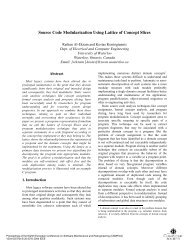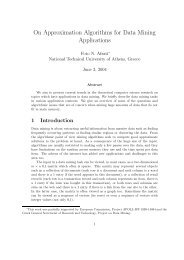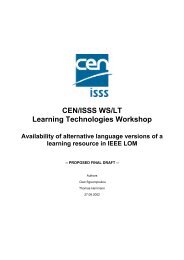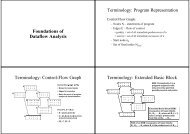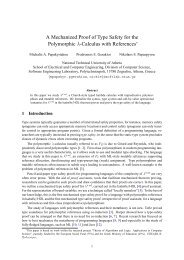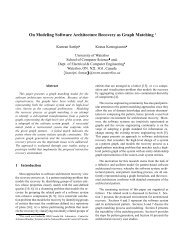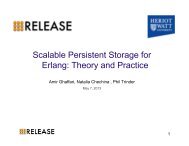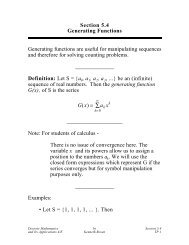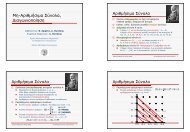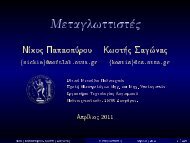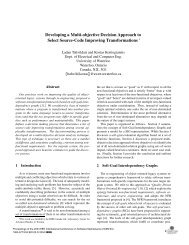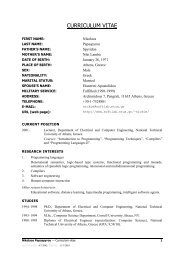Manual
Manual
Manual
Create successful ePaper yourself
Turn your PDF publications into a flip-book with our unique Google optimized e-Paper software.
58 Bison 2.3<br />
the warning about these conflicts unless the number of conflicts changes. You can do this<br />
with the %expect declaration.<br />
The declaration looks like this:<br />
%expect n<br />
Here n is a decimal integer. The declaration says there should be n shift/reduce conflicts<br />
and no reduce/reduce conflicts. Bison reports an error if the number of shift/reduce conflicts<br />
differs from n, or if there are any reduce/reduce conflicts.<br />
For normal LALR(1) parsers, reduce/reduce conflicts are more serious, and should be<br />
eliminated entirely. Bison will always report reduce/reduce conflicts for these parsers. With<br />
GLR parsers, however, both kinds of conflicts are routine; otherwise, there would be no<br />
need to use GLR parsing. Therefore, it is also possible to specify an expected number of<br />
reduce/reduce conflicts in GLR parsers, using the declaration:<br />
%expect-rr n<br />
In general, using %expect involves these steps:<br />
• Compile your grammar without %expect. Use the ‘-v’ option to get a verbose list of<br />
where the conflicts occur. Bison will also print the number of conflicts.<br />
• Check each of the conflicts to make sure that Bison’s default resolution is what you<br />
really want. If not, rewrite the grammar and go back to the beginning.<br />
• Add an %expect declaration, copying the number n from the number which Bison<br />
printed. With GLR parsers, add an %expect-rr declaration as well.<br />
Now Bison will warn you if you introduce an unexpected conflict, but will keep silent<br />
otherwise.<br />
3.7.9 The Start-Symbol<br />
Bison assumes by default that the start symbol for the grammar is the first nonterminal<br />
specified in the grammar specification section. The programmer may override this restriction<br />
with the %start declaration as follows:<br />
%start symbol<br />
3.7.10 A Pure (Reentrant) Parser<br />
A reentrant program is one which does not alter in the course of execution; in other words, it<br />
consists entirely of pure (read-only) code. Reentrancy is important whenever asynchronous<br />
execution is possible; for example, a nonreentrant program may not be safe to call from a<br />
signal handler. In systems with multiple threads of control, a nonreentrant program must<br />
be called only within interlocks.<br />
Normally, Bison generates a parser which is not reentrant. This is suitable for most<br />
uses, and it permits compatibility with Yacc. (The standard Yacc interfaces are inherently<br />
nonreentrant, because they use statically allocated variables for communication with yylex,<br />
including yylval and yylloc.)<br />
Alternatively, you can generate a pure, reentrant parser. The Bison declaration %pureparser<br />
says that you want the parser to be reentrant. It looks like this:<br />
%pure-parser



